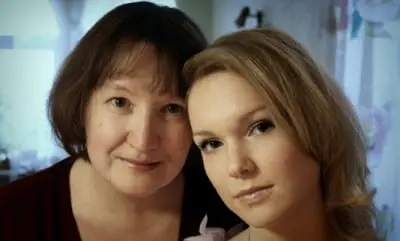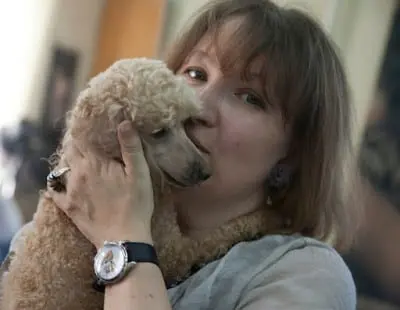Dina Sabitova, having two young sons, took a 16-year-old girl into the family, who was returned to the orphanage by her former foster parents. The story of Dina and Luda was told by the Change One Life Foundation in February 2013. The experience of communicating with the adopted daughter is also reflected in Dina’s book “Three of Your Names”. Almost a year after the publication of her story, Dina told the correspondent of the Victoria Polezhaeva Foundation about finding yourself, civil initiatives, foster children and books about orphans.

– What do you think, when in what situations or at what age does a person think about what they will leave behind? Tell us, how did this happen to you?
“You’re practically immortal until you’re thirty. You play with thoughts of death, if you are lucky, then death is so rare that it does not exist. This means that the thoughts about “what will remain after me” are very bookish.
Now, I think that I have already lived more than half of my life, and I understand that there will be children, maybe books, maybe the memory of former students.
– Your story of a foster mother and daughter — can we say that your experience of adoption served as an example for your friends or acquaintances?
– We all, in any of our actions, can be for someone, if not an example, then a precedent. To know that this is how it is possible, that people do this, and continue to live, and live normally, well-this often pushes you to take your own step in the same direction.
But when I am asked for advice on whether to take a teenager from an orphanage into the family, I always answer very unenthusiastically. Because I will not be responsible for the consequences of this decision – and neither my example, nor even the advice ” take it, take it!– – can not be the basis of such an act. It should be understood that each story of the adoption of a child is unique in some way (despite all the usual stages of adaptation, common and predictable difficulties, etc.). I was lucky with an easy adaptation and a wonderful easy child, but…
Yes, I have friends who say that our story inspired them to make changes in the family. I am happy about this because most of these stories are very happy, which means that the chain of precedents is branching out.
– How did this story reflect in your work — you wrote the books “Where there is no Winter”, “Three of Your Names”, “Fairy Tales about Martha”, and something else? How exactly?
– Yes, we ended up with three books about orphans. Friends are already joking without malice, they say, stop writing about it-the topic is a win-win, but as much as possible.
I find myself thinking that most of the interesting stories around me are somehow related to this topic. And therefore I do not write the fourth book: I do not write about other things, but about orphans-enough for now….
– Why, in your opinion, are there more and more different charitable organizations, volunteers, and people who are ready to help people they don’t know? Do you have such friends, how exactly and to whom they help?
– People are actively looking for the meaning of life. Few people are lucky – few people have a really meaningless job. And when a manager, or an economist, or an engineer suddenly realizes that the good of his 8 hours in the office is not added, and his strength and time are going somewhere, he is looking for meaning in something else. In minimizing other people’s pain. In increasing happiness.
When I was 30, I realized that my job as a Russian language teacher was eventually going to the sand. My students become anything but teachers, and there doesn’t seem to be any point in giving my best in class. In that crisis, I went through all the professions in my mind and realized that I was ready to give up everything and go to study at a medical school as an obstetrician.

I didn’t do it, of course, but I remember the feeling of pointlessness of doing almost any career very well.
I have a wide circle of contacts in LiveJournal and Facebook, there are friends who are looking for people in the framework of the initiative “Lisa Alert”, there are people who collect money for the treatment of children from orphanages (and not always a fund, often-just a personal initiative based on the impeccable reputation of the “collector”), there are those who help grown-up children to get an education, there are friends who collect gifts and write letters to the elderly in nursing homes, there are people who have organized a rehabilitation center for children with cerebral palsy on a charitable basis… There are, by the way, those who help not people, but cats or dogs.
Our country, unfortunately, provides more than necessary opportunities for the application of its forces in these areas…
– How and what, in your opinion, should those who think about charity and volunteering do: apply to foundations and communities, or change something around themselves?
– I do not know exactly how large funds operate. If we talk about personal satisfaction (“I do a small, but real thing”), then I am more in favor of small civic initiatives. For unofficial actions. For direct help from person to person. For civil communities of non-global size, in which you understand who and what exactly is doing here. For such communities, in which the word ” we ” means for you the faces of specific people – your like-minded people.
– How should children be brought up so that in the future Russia will have the society that is now commonly called civil?
– I try to raise my children from the position of “every person is valuable”. I think that the obvious idea – ” every person is valuable” – has two consequences. If a person is a value, then he must live in conditions worthy of a person. And – if a person is valuable – then he can do a lot.









